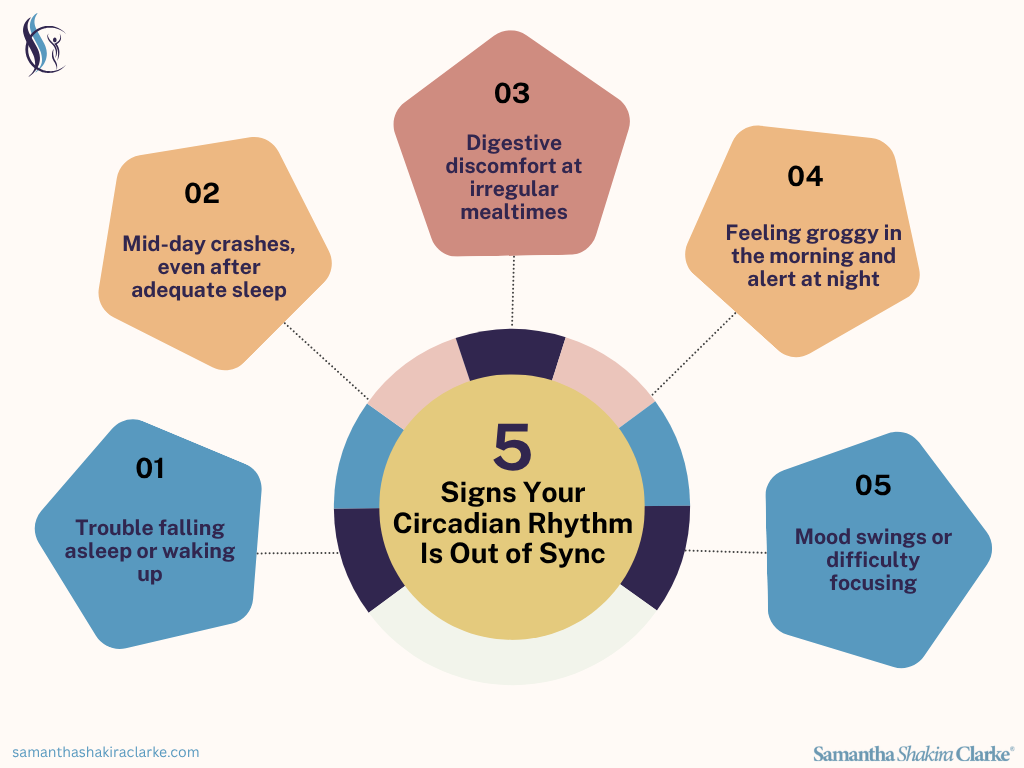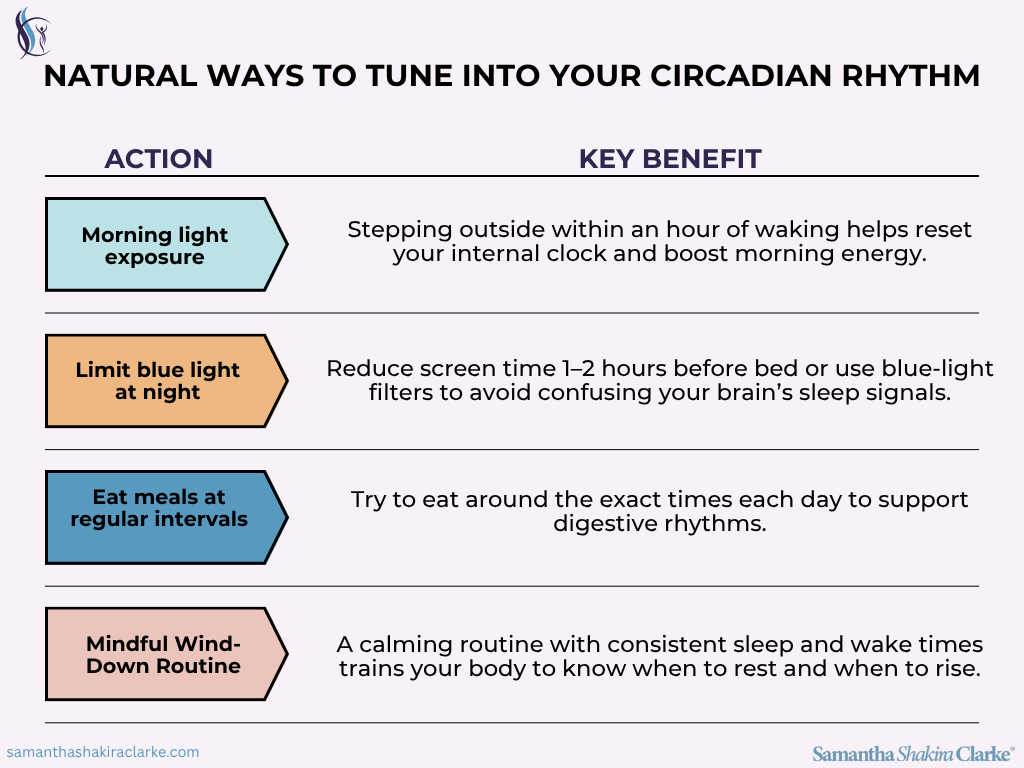 Book Now!
Book Now!We all want to feel well-rested, mentally sharp, and physically energized. But if your sleep feels off, your energy crashes mid-afternoon, or your focus fizzles out when you need it most, your circadian rhythm might be trying to tell you something. Understanding and aligning with your body’s internal clock isn't just about sleep; it's a foundational step toward better overall health, mood, and productivity.
The good news? You don’t have to overhaul your entire routine to feel better. Small shifts in when you eat, sleep, move, and work can help your internal rhythm get back on track. At Samantha Shakira Clarke, we believe in realistic, human-centred wellness that meets you where you are. In this blog, we’ll explore what circadian rhythm really means, how it affects your everyday energy, and simple ways to reset it so that you can feel more like yourself again.
Have you ever noticed how you feel more energized at certain times of the day and struggle to stay awake at others, even if you've had a good night's rest? That’s your circadian rhythm at work. This built-in biological clock influences more than just sleep; it affects your hormone levels, digestion, energy, and mood. When you’re in sync with it, your body runs like clockwork. When you’re not, everything feels just a little harder.
When we override our rhythm by staying up too late, eating at irregular times, or staring at screens before bed, it becomes harder to wake up refreshed, concentrate during meetings, or feel truly rested, regardless of how many hours we spend in bed.
Your circadian rhythm is a 24-hour cycle that regulates your sleep-wake patterns, guided by external cues like light and darkness. It's controlled by a part of your brain called the suprachiasmatic nucleus, which helps determine when you feel alert or sleepy. The term itself comes from the Latin “circa diem,” meaning “around a day.”
Your rhythm affects core body functions like metabolism, hormone production, and body temperature. Disrupting this rhythm can throw all these processes off balance, leading to that wired-at-night, groggy-by-day feeling so many of us know too well.
A healthy circadian rhythm supports everything from quality sleep to immune function. It helps your body know when to rest, when to eat, and when to be alert, creating a natural rhythm for your daily life. When this rhythm is stable, your hormones, metabolism, and mood tend to stay balanced. Over time, honouring this cycle can reduce your risk of chronic conditions like heart disease, obesity, and anxiety, making it not just about better sleep, but better health overall.
Studies show that disrupted circadian rhythms are linked to increased risks of obesity, diabetes, depression, and even certain cancers (NIH). When your rhythm is aligned, your body performs better, not just physically, but also emotionally and cognitively. You feel more balanced, energetic, and focused.

Sometimes, your body gives subtle signals when it’s out of rhythm, and it’s easy to miss them if you’re not paying close attention. Some common signs include:
It’s your body’s way of saying: “Something’s off.” And it’s worth paying attention.
Even minor disruptions to your routine can throw off your body’s internal clock. From screen time before bed to skipped meals or late-night work, these habits confuse your brain about when to rest and recharge. Let’s look at some common culprits that quietly interfere with your natural rhythm.
Speaking of burnout, irregular sleep cycles and chronic stress often go hand in hand. If you’re wondering whether burnout could be contributing to your energy dips or restless nights, this guide on beating burnout is a helpful place to start.
Resetting your circadian rhythm doesn’t require a complete lifestyle overhaul, just a few mindful changes that add up over time. Start by stepping outside within an hour of waking. Exposure to natural morning light helps reset your internal clock and provides a healthy energy boost for the day ahead. In the evening, limit blue light exposure by reducing screen time one to two hours before bed or using blue-light filters.
This prevents your brain from receiving mixed signals about when it’s time to wind down. Your eating habits also matter. Try to eat meals at consistent times each day to support your digestive rhythm, which plays a surprisingly important role in circadian health. Finally, adopt a calming nighttime routine, whether that’s reading, stretching, or journaling, and pair it with regular sleep and wake times. These small, consistent actions gently train your body to know when it’s time to rest and when it’s time to rise, promoting deeper sleep and better overall energy.

According to a study by the Sleep Foundation, 87% of people report better sleep when they maintain consistent routines and avoid screen exposure before bed.
Not everyone is wired the same. Your chronotype, your natural sleep and energy pattern, affects when you feel most alert or tired. Some people naturally feel energized at sunrise (early birds), while others hit their stride after dark (night owls). These tendencies aren't a result of laziness or a lack of discipline; they’re biologically hardwired and deeply personal. When you understand your chronotype, you gain permission to stop fighting your body and start building a lifestyle that works with it, not against it.
Knowing your chronotype helps you plan your day to match your energy curve. Whether you're scheduling workouts, creative work, or meetings, working with your rhythm, not against it, makes all the difference. Learn more about chronotypes from this Harvard Health article.
If you’ve tried adjusting your habits but still feel persistently tired, unfocused, or disconnected, it might be time to seek professional support. Sleep specialists, wellness coaches, or integrative doctors can help identify underlying issues such as insomnia, hormone imbalances, or chronic fatigue.
Also, don’t hesitate to check in with your team or family. Our needs differ; some people might thrive with more physical activity, while others require emotional or nutritional support. Consider asking your employees or coworkers what helps them feel most regulated. Building a rhythm-friendly environment is easier when it’s collaborative and inclusive.
Your circadian rhythm isn’t just a scientific concept; it’s your body’s built-in way of guiding you toward better health, energy, and clarity. When you understand and work with your rhythm, your days feel more energized, your nights more restful, and your mind more focused.
If you're ready to explore more sustainable wellness strategies for yourself or your workplace, book a discovery call with Samantha Shakira Clarke or reach out at team@samanthashakiraclarke.com. Let’s work together to create rhythms that support your real-life needs.


